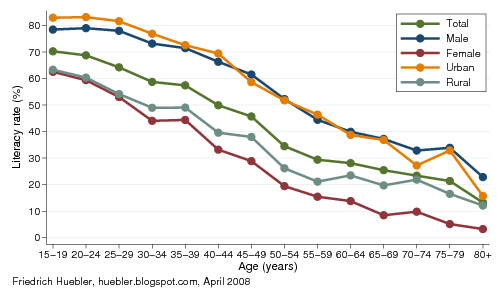In Nigeria, 55% of the population aged 15 years and older can read and write according to the findings of the DHS. More men (67%) than women (44%) are literate, and the literacy rate is higher in urban (71%) than in rural areas (47%).
Adult literacy rate in Nigeria, 2003
| Category | Literacy rate (%) |
| Male | 67.3 |
| Female | 43.7 |
| Urban | 70.9 |
| Rural | 46.8 |
| Total | 55.3 |
Although almost half of all adult Nigerians cannot read and write, analysis of the survey data by age reveals a steady increase in literacy over the years. Today, more children go to school and learn to read and write than in previous decades. As a result, younger persons are much more likely to be literate than older persons. For the graph below, the survey respondents were divided into 5-year age groups. Among persons aged 15 to 19 years - those who were of primary school age in the 1990s - the literacy rate is 70%. Among persons 80 years or older, only 13% are literate.
A similar rate of increase in the literacy rate can be observed for men, women, urban residents, and rural residents. Among women 80 years or older, only 3% can read and write, compared to 23% of all men in the same age group. Among 15- to 19-year-olds, the female literacy rate is 63% and the male literacy rate 79%. While literacy rates have increased steadily for men and women, there continues to be a large gender gap. A similar gap exists between residents of urban and rural areas.
Adult literacy rate in Nigeria by age, gender and area of residence, 2003

Source: Nigeria Demographic and Health Survey 2003
References
- National Population Commission (NPC) [Nigeria] and ORC Macro. 2004. Nigeria Demographic and Health Survey 2003. Calverton, Maryland: National Population Commission and ORC Macro. (Download report, PDF format, 4 MB)
- Self-reported and tested literacy in Nigeria
- Adult literacy rates
- Disparity between male and female literacy rates
- Years of schooling and literacy: Can everyone with primary education read and write?
- Primary school attendance in Nigeria
- Secondary school attendance in Nigeria
- Age and level of education in Nigeria
External links
Friedrich Huebler, 5 April 2008 (edited 13 April 2008), Creative Commons LicensePermanent URL: http://huebler.blogspot.com/2008/04/adult-literacy-in-nigeria.html
No comments:
Post a Comment